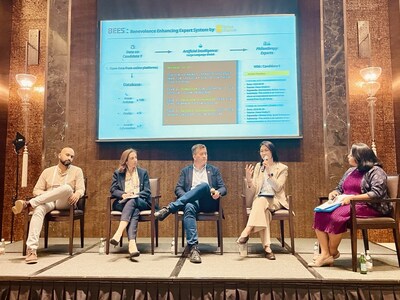Nine Major Proposals for Government Regulating Artificial Intelligence Favored by Very Large Bipartisan Majorities of Voters
Mar 29, 2024
COLLEGE PARK, Md., March 29, 2024 /PRNewswire/ — As the House’s new Task Force on Artificial Intelligence (AI) considers how government should address AI issues, such as deepfakes in the election and bias in algorithms, a new survey conducted by the Program for Public Consultation at the University of Maryland’s School of Public Policy finds very large bipartisan majorities favor giving the federal government broad powers to regulate AI. They endorse seven proposals currently under consideration in Congress and the Executive Branch for regulating AI-generated deepfakes and AI making decisions with the potential for harm.
Internationally, as the UN agrees on a US-led resolution to ensure AI does not violate human rights, voters favor the US working to establish an international agency to regulate large-scale AI projects, and create an international treaty prohibiting AI-controlled weapons.
To ensure that respondents understood issues around AI, respondents were provided in-depth briefings and arguments for and against each proposal, reviewed by experts on each side of the debates.
Creating new laws for AI-generated deepfakes registered overwhelming bipartisan support. All three proposals surveyed garnered the support of over eight-in-ten Republicans and Democrats:
- Prohibit the use of deepfakes in political campaign advertisements, such as to depict an opponent saying something they did not, or an event that did not occur. (National 84%, Republicans 83%, Democrats 86%)
- Prohibit the public distribution of any pornographic deepfake made without the consent of the person being depicted. (National 86%, Republicans 85%, Democrats 87%)
- Require that all deepfakes shared publicly be clearly labeled as such. (National 83%, Republicans 83%, Democrats 85%)
Large bipartisan majorities also favor three proposals for closely regulating AI programs that make decisions which can significantly impact people’s lives, including in healthcare, banking, hiring, and welfare.
More than seven-in-ten voters favor proposals that would:
- Require these AI programs pass a test before putting to use, which would evaluate whether they may violate regulations, make biased decisions, or have security vulnerabilities. (National 81%, Republicans 76%, Democrats 88%)
- Allow the government to audit programs that are in use, and require the AI company to fix any problems that are found. (National 77%, Republicans 74%, Democrats 82%)
- Require AI companies to disclose information to the government about how the decision-making AI was trained, if requested, to aid with pre-testing and audits. (National 72%, Republicans 67%, Democrats 81%)
Creating a federal agency for AI to enforce regulations, oversee AI development and provide guidance on AI policy is supported by 74% (Republicans 68%, Democrats 81%).
Americans support the creation of an international regulatory agency for large-scale AI. A large bipartisan majority (77%) favors the creation of such an agency to develop international standards and monitor and inspect whether their standards are being met (Republicans 71%, Democrats 84%).
Americans also support creating a treaty to prohibit the development of weapons that can use AI to fire on targets without human control – called lethal autonomous weapons. A large bipartisan majority (81%) favors the US working to establish such a treaty and creating an international agency to enforce it (Republicans 77%, Democrats 85%).
“Large majorities of Republicans as well as Democrats favor creating robust federal and international agencies to regulate AI and protect people from deepfakes, biased decision-making, and other potential harms from AI,” comments Steven Kull, director of PPC.
The survey was fielded online February 16-23, 2024 with a representative non-probability national sample of 3,610 registered voters provided by Precision Sample. The confidence interval varies from +/- 1.4 to 1.8%.
- Full Report: https://publicconsultation.org/wp-content/uploads/2024/03/AI_Report_0324.pdf
- Questionnaire: https://publicconsultation.org/wp-content/uploads/2024/03/AI_Quaire_0224-1.pdf
- Policymaking Simulation: http://s.alchemer.com/s3/AI-Full
CONTACT: JP Thomas; 375387@email4pr.com; 617-899-8570
![]() View original content to download multimedia:https://www.prnewswire.com/news-releases/nine-major-proposals-for-government-regulating-artificial-intelligence-favored-by-very-large-bipartisan-majorities-of-voters-302103221.html
View original content to download multimedia:https://www.prnewswire.com/news-releases/nine-major-proposals-for-government-regulating-artificial-intelligence-favored-by-very-large-bipartisan-majorities-of-voters-302103221.html
SOURCE Program for Public Consultation
YOU MAY ALSO LIKE
Warning: mysqli_query(): (HY000/1): Can't create/write to file '/tmp/#sql_3e54_0.MYI' (Errcode: 28 - No space left on device) in /home/contentenginellc/public_html/wp-includes/wp-db.php on line 1938


